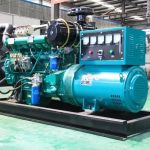Diesel Generators for Energy Storage Systems A Comprehensive Guide
Introduction In recent years, the increasing demand for reliable and sustainable energy sources has led to the development of energy storage systems that can store and distribute electricity when needed. One of the key components of these systems is the diesel generator, which plays a crucial role in ensuring uninterrupted power supply. In this article, we will explore the role of diesel generators in energy storage systems, their benefits, challenges, and future prospects. Overview of Energy Storage Systems Energy storage systems are designed to store excess electricity generated during off-peak hours and supply it during peak demand periods. These systems help to balance the supply and demand of electricity, enhance grid stability, and integrate renewable energy sources into the grid. Energy storage technologies include batteries, flywheels, pumped hydro storage, and thermal storage systems. url in Energy Storage Systems Diesel generators are commonly used as a backup power source in energy storage systems to provide electricity during periods of high demand or when renewable energy sources are not generating power. These generators are reliable, efficient, and cost-effective, making them an ideal choice for energy storage applications. Benefits of Diesel Generators in Energy Storage Systems 1. Reliability: Diesel generators are known for their reliability and can provide backup power in case of grid outages or fluctuations. This ensures uninterrupted power supply to critical infrastructure such as hospitals, data centers, and industrial facilities. 2. Fast Start-up Time: Diesel generators have a fast start-up time, allowing them to quickly respond to changes in demand or supply of electricity. This flexibility makes them suitable for energy storage systems that require rapid deployment of backup power. 3. Fuel Efficiency: Diesel generators are fuel-efficient and can generate power at a lower cost compared to other backup power sources. This makes them a cost-effective option for energy storage systems that require long-duration power supply. 4. Scalability: Diesel generators can be easily scaled up or down based on the power requirements of the energy storage system. This scalability allows for the efficient management of power generation and distribution. Challenges of Diesel Generators in Energy Storage Systems While diesel generators offer several benefits, they also face challenges in energy storage systems, including: 1. Environmental Impact: Diesel generators emit harmful pollutants such as nitrogen oxides (NOx) and particulate matter, contributing to air pollution and climate change. To mitigate these environmental impacts, advanced emission control technologies and cleaner fuels can be used. 2. Noise Pollution: Diesel generators are known for their noise emissions, which can be a concern in residential areas or sensitive environments. Soundproofing measures and proper maintenance can help reduce noise pollution from diesel generators. 3. Maintenance Requirements: Diesel generators require regular maintenance to ensure optimal performance and reliability. This includes fuel quality monitoring, lubrication checks, and periodic servicing of engine components. 4. Fuel Storage and Supply: Diesel generators rely on a constant supply of fuel, which can be a logistical challenge in remote or off-grid locations. Adequate fuel storage facilities and fuel management strategies are essential to ensure uninterrupted operation of diesel generators. Future Prospects of Diesel Generators in Energy Storage Systems Despite the challenges associated with diesel generators, advancements in technology and regulatory measures are driving the adoption of cleaner and more efficient diesel generators in energy storage systems. Future prospects for diesel generators in energy storage systems include: 1. Hybrid Systems: Integrating diesel generators with renewable energy sources such as solar and wind power can enhance the overall efficiency and reliability of energy storage systems. Hybrid systems combine the benefits of diesel generators with the sustainability of renewable energy sources. 2. Smart Grid Integration: Diesel generators equipped with smart grid technologies can optimize power generation and distribution based on real-time demand and supply conditions. This integration improves grid stability and enables efficient energy management. 3. Energy Storage Innovation: Research and development efforts are focused on improving the efficiency and sustainability of energy storage systems, including the integration of advanced battery technologies and energy management systems. Diesel generators will continue to play a vital role in these innovative energy storage solutions.  Conclusion Diesel generators are an essential component of energy storage systems, providing reliable backup power and supporting grid stability. While they face challenges such as environmental impact and maintenance requirements, advancements in technology and regulatory measures are driving the adoption of cleaner and more efficient diesel generators. The future prospects of diesel generators in energy storage systems are promising, with hybrid systems and smart grid integration leading the way towards a more sustainable energy future. By leveraging the benefits of diesel generators and addressing their challenges, energy storage systems can enhance grid reliability, integrate renewable energy sources, and meet the growing demand for electricity in a sustainable manner.
Conclusion Diesel generators are an essential component of energy storage systems, providing reliable backup power and supporting grid stability. While they face challenges such as environmental impact and maintenance requirements, advancements in technology and regulatory measures are driving the adoption of cleaner and more efficient diesel generators. The future prospects of diesel generators in energy storage systems are promising, with hybrid systems and smart grid integration leading the way towards a more sustainable energy future. By leveraging the benefits of diesel generators and addressing their challenges, energy storage systems can enhance grid reliability, integrate renewable energy sources, and meet the growing demand for electricity in a sustainable manner.